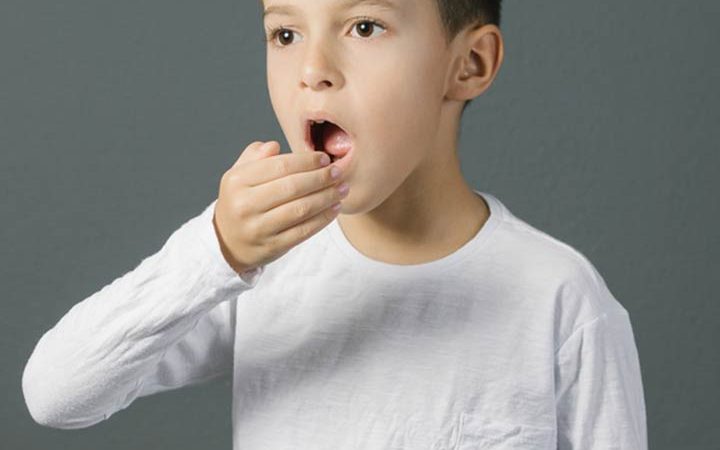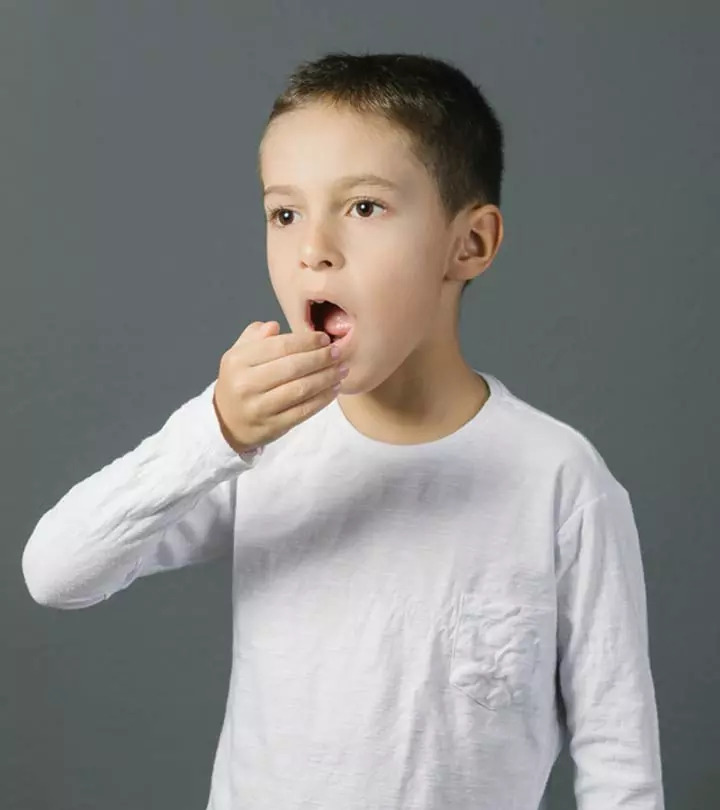Halitosis or bad breath in children is common. It can originate from oral and non-oral sources; 87% of cases arise from an oral source, and 13% from non-oral sources (1).
Bad breath is alike in children and adults when they wake up in the morning because of increased bacterial activity in the mouth. However, morning breath is temporary and goes away after brushing the teeth and rinsing the mouth (2). If the child complains of bad odor at other times and when it is a persistent problem, you should bring it to the healthcare professional’s notice. Read this post to learn about the causes, treatment, prevention, and home remedies of bad breath in children.
Causes Of Bad Breath In Children
The following are some probable causes of bad breath in children (1) (2) (3):
1. Poor oral hygiene
Certain areas in the mouth, such as pits and grooves on the surface of teeth, areas between teeth and gums, or on the pores of the tongue, get trapped with food particles. The bacteria in the mouth degrade protein materials from these food remnants producing amino acids and offensive gases.
2. Decayed teeth
Tooth decay promotes an environment for bacterial growth, and the accumulation of food in these cavities leads to a foul smell from the mouth.
3. Dental abscess
There might be pus discharge from an abscessed tooth. Pus may lead to a foul smell from the oral cavity.
4. Periodontal diseases
Gingivitis is an inflammatory condition of the gums that may lead to smelly mouth in children. Plaque build-up is the main cause of gum diseases. Improper removal of dental plaque may lead to a foul smell from the mouth.
5. Mouth breathing
Due to mouth breathing, the saliva may evaporate, and there is a loss of washing and self-cleansing action of the saliva. As a result, it increases microbial growth and causes a bad smell from the mouth.
6. Dry mouth
Dehydration, some salivary gland diseases, or certain medicines may reduce salivary production and bad breath.
7. Malocclusion
Malocclusion is characterized by crooked, crowded, protruding, or malpositioned teeth. Maintaining hygiene is more difficult for these teeth, and food particles might get stuck between the teeth. In addition, it leads to increased microbial growth and results in a bad smell from the mouth.
8. Orthodontic appliances
Improper cleaning of appliances such as braces, orthodontic retainers, space maintainers, or athletic mouth guards may lead to a build-up of odor-causing bacteria on the appliance and in the mouth.
9. Poor dental fillings
Improperly done amalgam or composite restorations cannot be cleaned well by a toothbrush or floss, especially in the interdental areas. It may lead to food impaction and a bad smell from the mouth.
10. Foreign body in the nose
Foreign bodies such as peas, beans, or small parts of toys stuck in the nose may lead to infection and bad breath.
11. Tonsils
Infected tonsils in children have a cauliflower-like appearance, and there may be food lodgement occurring in the grooves that appear on its surface. In addition, it may lead to bad breath in children.
12. Medical conditions
Certain health complications such as mouth sores, asthma, enlarged adenoids, diabetes, kidney failure, liver problems, or oral cancer may cause foul oral smell.
13. Infections
In children undergoing chemotherapy for cancer, fungal infections may occur and can lead to bad breath in children. In addition, sinus infections or stomach infections may also cause a bad breath.
14. Certain medicines
Certain drugs such as antihistamines, tranquilizers, and phenothiazines lead to a reduction in salivary production. As a result, it leads to foul oral odor. Likewise, unnecessary and excessive use of antibiotics reduces oral bacterial load and results in fungal infections and foul odor.
15. Dietary changes
Some food items such as garlic, onions, or other spices have a strong smell. After digestion and absorption of these food items, the strong-smelling molecules enter the bloodstream and exhale from the lungs while breathing, causing bad breath.
16. Smoking
Smoking affects the composition of bacteria in the plaque, leading to a foul smell.
Home Remedies And Prevention Of Bad Breath In Children
Regular brushing, flossing, and dental checkups are important in preventing bad breath in children. Apart from them, the following measures can help minimize bad odor from the oral cavity (4) (5) (6).
- Ample hydration helps flush oral debris and thereby prevents bad breath.
- According to the Centers for Disease Control and Prevention (CDC), replace the toothbrush once in two to three months or sooner if the bristles look worn out (7).
- Clean the child’s tongue gently using a tongue cleaner.
- Use commercially available kid-friendly mouthwashes, or you may make them at home by mixing one cup water, one teaspoon of baking soda, and a drop of peppermint oil. Ensure the child does not swallow the mouthwash.
- Consuming salads and fresh fruits inhibitbad breath and aid in self-cleansing.
- Chewing on a sprig of parsley, mint, or herbs such as basil may help neutralize bad breath.
- Use a humidifier to help prevent nasal and oral dryness in the child’s room.
- Cut down caffeinated and sugary drinks, such as coke and coffee.
- Remove the removable orthodontic appliances every day and clean them well per your pediatric dentist’s instructions.
Treatment For Bad Breath In Children
The following treatment plans may be suggested depending on the underlying cause.
- Get the recommended regular dental scaling once every six months.
- If the child is experiencing symptoms of gingivitis such as swollen or bleeding gums along with bad breath, an additional session of scaling and root planning can help get rid of the problem.
- If the child has cavities or other improper dental fillings, get proper fillings for your child.
- If your child exhibits mouth breathing, get them examined by an otolaryngologist to rule out enlarged adenoids or infected tonsils. Seek the doctor’s guidance if surgical removal is recommended (6).
- If the child seems dehydrated, ensure immediate medical attention. You can read more about dehydration in children
- Consult an orthodontist if you think your child has misaligned teeth and associated bad breath.
- If you notice pus discharge from the nose, contact emergency medical care.
- If the child exhibits any signs of infection, complete the entire course of antibiotic treatment as advised by the doctor.
Bad breath can cause problems with self-esteem, self-confidence and may also lead to bullying in children. In most cases, they may not be aware of the bad smell. The healthcare provider will investigate the underlying cause and refer to a specialist accordingly.
References:
MomJunction’s articles are written after analyzing the research works of expert authors and institutions. Our references consist of resources established by authorities in their respective fields. You can learn more about the authenticity of the information we present in our editorial policy.
The following two tabs change content below.




































